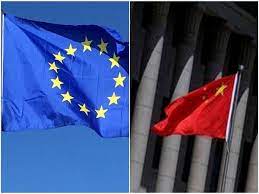
Following tit-for-tat sanctions that were imposed kin March over the China’s treatment of its Uyghur population, the efforts to ratify a massive investment deal between China and the European Union have in effect been suspended, the European Commission has said.
“We now in a sense have suspended … political outreach activities from the European Commission side,” said the commission’s executive vice-president, Valdis Dombrovskis. The present condition of the mutual relations between China and the EU were “not conducive” for the EU to ratify the deal which has been named as the EU-China comprehensive agreement on investment.
“It’s clear in the current situation with the EU sanctions in place against China and Chinese counter sanctions in place, including against members of European parliament [that] the environment is not conducive for ratification of the agreement,” Dombrovskis said.
The ratification of the deal will now “depend really on how broader EU-China relations will evolve”, he added.
Even though the comments made by Dombrovskis is not directly suggestive of formal suspension of the trade deal, they however do indicate that the appetite of the EU for the deal with China has been dampened because of the recent mutual tensions between Brussels and Beijing.
Following years of extended negotiations, a controversial investment agreement was approved by the European Union and China in late December. It is suggested that the talks were pushed by the German chancellor, Angela Merkel, since it is believed that there is a large presence of German carmakers and manufacturers and therefore the Chinese market is especially important for Germany.
While singing the initial agreement in December, the trade deal with China was described as being a long overdue one for European companies who would be benefitted with the opening up of the Chinese market for them because of the deal. If the trade pact was ratified by both the parties, it is expected that the notoriously stringent rules on foreign companies imposed by China such as the need to operate through joint ventures with local partners, would be loosened by Beijing.
For China’s leader, Xi Jinping, the conclusion of the negotiations was a diplomatic victory. The talks were wrapped up in a video call with Xi, the European Commission president, Ursula von der Leyen, president Emmanuel Macron of France and Merkel herself.
But China sceptics and human rights activists in Europe were unhappy with the agreement.
Some of those groups had been putting pressure on the EU for long to impose sanctions on China over its treatment of its Uyghur population and its aggressive policy in Hong Kong. Displeasure was also publicly voiced by the Biden administration.
There was however a dramatic turn of events in March. Sanctions on four Chinese officials involved in Beijing’s policy on Xinjiang were imposed by the European Union. CHiona was quick to respond as it too imposed its own sanctions that were targeted at a number of high profile members of the European parliament , three members of national parliaments, two EU committees, as well as number of China-focused European academics.
(Source:www.theguardian.com)
“We now in a sense have suspended … political outreach activities from the European Commission side,” said the commission’s executive vice-president, Valdis Dombrovskis. The present condition of the mutual relations between China and the EU were “not conducive” for the EU to ratify the deal which has been named as the EU-China comprehensive agreement on investment.
“It’s clear in the current situation with the EU sanctions in place against China and Chinese counter sanctions in place, including against members of European parliament [that] the environment is not conducive for ratification of the agreement,” Dombrovskis said.
The ratification of the deal will now “depend really on how broader EU-China relations will evolve”, he added.
Even though the comments made by Dombrovskis is not directly suggestive of formal suspension of the trade deal, they however do indicate that the appetite of the EU for the deal with China has been dampened because of the recent mutual tensions between Brussels and Beijing.
Following years of extended negotiations, a controversial investment agreement was approved by the European Union and China in late December. It is suggested that the talks were pushed by the German chancellor, Angela Merkel, since it is believed that there is a large presence of German carmakers and manufacturers and therefore the Chinese market is especially important for Germany.
While singing the initial agreement in December, the trade deal with China was described as being a long overdue one for European companies who would be benefitted with the opening up of the Chinese market for them because of the deal. If the trade pact was ratified by both the parties, it is expected that the notoriously stringent rules on foreign companies imposed by China such as the need to operate through joint ventures with local partners, would be loosened by Beijing.
For China’s leader, Xi Jinping, the conclusion of the negotiations was a diplomatic victory. The talks were wrapped up in a video call with Xi, the European Commission president, Ursula von der Leyen, president Emmanuel Macron of France and Merkel herself.
But China sceptics and human rights activists in Europe were unhappy with the agreement.
Some of those groups had been putting pressure on the EU for long to impose sanctions on China over its treatment of its Uyghur population and its aggressive policy in Hong Kong. Displeasure was also publicly voiced by the Biden administration.
There was however a dramatic turn of events in March. Sanctions on four Chinese officials involved in Beijing’s policy on Xinjiang were imposed by the European Union. CHiona was quick to respond as it too imposed its own sanctions that were targeted at a number of high profile members of the European parliament , three members of national parliaments, two EU committees, as well as number of China-focused European academics.
(Source:www.theguardian.com)














